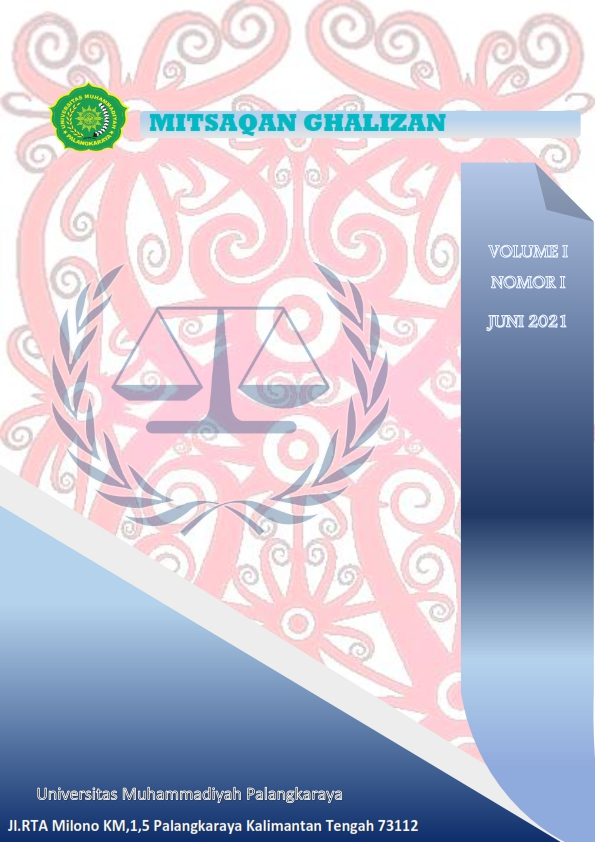PENGARUH GENDER DALAM REFORMASI KEADILAN
Main Article Content
Abstract
Justice is the essence of what society aspires to, moreover justice in the legal aspects. The validity of the approval agreement from the evaluation of existence is appreciated by the court. Therefore, the role of justice is very urgent for the law, especially in Islamic law. In the perspective of Islamic law, gender justice has a unique and complex problem, namely in the Qur’an, An-Nissachapter verse 34, which essentially is to explain the position between men and women associated with various sources of life. Various interpretations of reformist Islamic thinkers led to speculation of ambiguity from the nature of true justice. The difference in defining the essence of justice in gender causes the understanding of the law to vary too, specifically in Islamic family law, the continuation of modern times today which emphasizes a situation in the viewpoint of humanity and human rights. Based on this, it is important to discuss gender related issues in justice reform seen from interpreting the Qur'an inAn-Nissachapter verse 34. The methodology of this research uses objective analysis with hermeneutics, while the data analysis technique used is analysis with qualitative descriptive techniques. The results of this study are to contribute to the understanding that the phenomenon of variations in interpretation of gender often raises contradictions between the doctrine of Religion and the reality of present life, and it seems that the purpose of the law was made not channeled to the lives of the people. With the method of ushulfiqh and hermeneutics to explore the nature of God's texts about gender justice, it is appropriate for the understanding of the text and the context of gender justice to have relations with law and life. The conclusions from this study are expected to provide additional knowledge and reference materials related to understanding gender hermeneutic analysis which is expected to be able to produce a legal reform of various aspects, especially Islamic family law.
Downloads
Article Details
References
Marlow, Louise. "Masyarakat Egaliter Visi Islam". Bandung : Mizan, 1999.
Izomiddin. "Pemikiran dan Filsafat Hukum Islam". Jakarta : PrenadaMedia Group, 2018.
Ahmad Saebani, Beni. "Fiqh Munakahat 2". Bandung : Pustaka Setia, 2016.
As-Suyuthi dan Al-Mahally. "Hasyiah Ash-Shawi ala Tafsir Jalalain juz 1". Jeddah : Al-Harmain.
Fakih, Mansour. "Analisis Gender dan Transformasi Sosial". Yogyakarta : Pustaka Pelajar, 2013.
Sholikhin, Muhammad. "Islam Rahmatan Lil'Alamin". Jakarta : PT. Elex Media Komputindo, 2013.
Munfarida, Elya. "Seksualitas Perempuan dalam Islam". Jurnal Studi Gender dan Anak 5, no.2 (2010) : 5.
Puspitawati, Herien. "Konsep, Teori dan Analisi Gender". Bogor : Departemen Ilmu Keluarga dan Konsumen Fakultas Ekologi Manusia, 2013.
Mulyadi, Ahcmad. "Relasi Laki-laki dan Perempuan. (Menabrak Tafsir Teks, Menakar Realitas)". Jurnal Al-Ihkam 7, no.2 (2012) : 248.
Shomad, Abd. "Hukum Islam Penormaan Prinsip Syariah dalam Hukum Indonesia". Jakarta : Kencana, 2017.
Kuncoro, Wahyu. "Waris Permasalahan dan Solusinya Cara Halal dan Legal Membagi Waris". Jakarta : Raih Asa Sukses, 2015
Ariyadi, Ariyadi. "Metodologi Istinbath Hukum Prof. Dr. Wahbah Az Zuhaili." Jurnal Hadratul Madaniyah 4.1 (2017)
